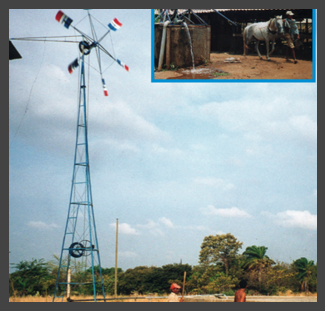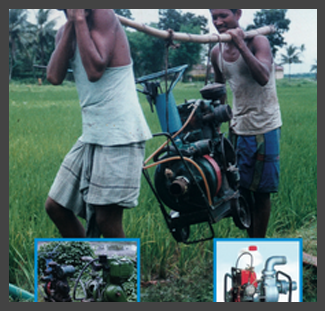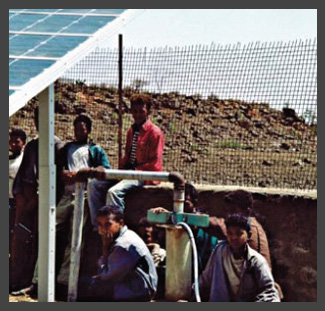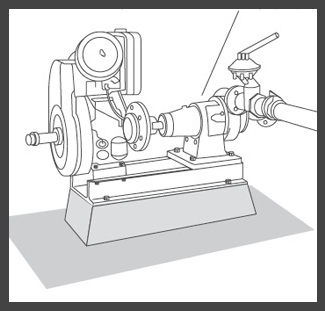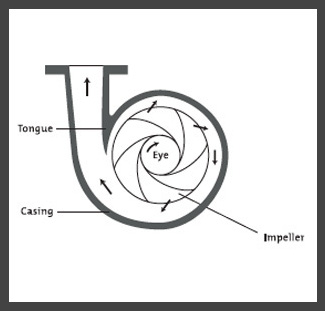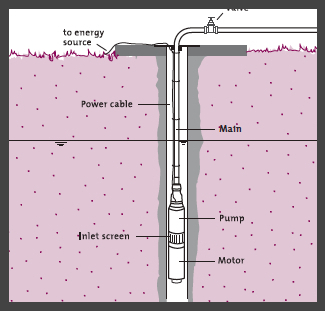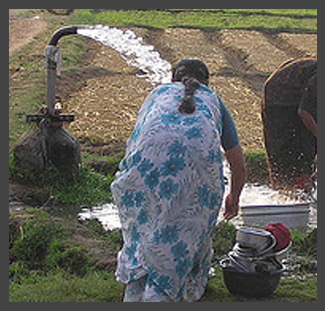Difference between revisions of "Powered pumps"
(→Small land owners and how they lift water in Africa) |
|||
| (20 intermediate revisions by 2 users not shown) | |||
| Line 1: | Line 1: | ||
| + | {{Language-box|english_link=Powered pumps |french_link=Les pompes à énergie |spanish_link=Coming soon|hindi_link=Coming soon|malayalam_link=Coming soon|tamil_link=Coming soon | korean_link=Coming soon | chinese_link=Coming soon | indonesian_link=Coming soon | japanese_link=Coming soon}} | ||
| + | |||
Powered pumps refer to pumps that are powered by sources such as: solar, animal, wind, diesel or biogas fuel, water, as well as suction, piston, centrifugal, and diaphragm technologies. The natural methods (wind and solar) are the most environmentally sustainable, yet may have greater initial costs. The hydraulic pump is both sustainable and inexpensive, yet must operate where a difference in water height occurs, e.g. mountainous areas. Some of the other pump technologies require specific maintenance that communities should be prepared for. Some pumps are better suited for community use and some for household use. Most pumps have depth limitations, so be sure to check how deep they can retrieve water. | Powered pumps refer to pumps that are powered by sources such as: solar, animal, wind, diesel or biogas fuel, water, as well as suction, piston, centrifugal, and diaphragm technologies. The natural methods (wind and solar) are the most environmentally sustainable, yet may have greater initial costs. The hydraulic pump is both sustainable and inexpensive, yet must operate where a difference in water height occurs, e.g. mountainous areas. Some of the other pump technologies require specific maintenance that communities should be prepared for. Some pumps are better suited for community use and some for household use. Most pumps have depth limitations, so be sure to check how deep they can retrieve water. | ||
| − | + | <small-title /> | |
| − | + | <div style=" background-color: #efefef; text-align: center; -moz-border-radius: 2px; -webkit-border-radius: 2px; border: 5px solid #dedede; padding: 5px;" > | |
| − | <div style=" background-color: #efefef; text-align: center; -moz-border-radius: | + | {|cellpadding="5" cellspacing="0" width="100%" |
| − | {|cellpadding=" | ||
|- | |- | ||
|colspan="5" style="background-color:#efefef;"| | |colspan="5" style="background-color:#efefef;"| | ||
|- | |- | ||
| − | + | |style="background:#efefef;"|[[Image:Horse_and_wind_powered_pumps.PNG|center|100px|link=Horse and wind powered pumps]] | |
| − | + | |style="background:#efefef;"|[[Image:Fuel_efficient_motor_pump.PNG|center|100px|link=Small and efficient motor pumps]] | |
| − | + | |style="background:#efefef;"|[[Image:SolarPump.jpg|center|100px|link=Solar powered pumps]] | |
| − | + | |style="background:#efefef;"|[[Image:dieselGenerator.jpg|center|100px|link=Diesel generator pump]] | |
| − | |||
| − | |style="background:#efefef;"|[[Image:Horse_and_wind_powered_pumps.PNG|center| | ||
| − | |style="background:#efefef;"|[[Image:Fuel_efficient_motor_pump.PNG|center| | ||
| − | |style="background:#efefef;"|[[Image:SolarPump.jpg|center| | ||
| − | |style="background:#efefef;"|[[Image:dieselGenerator.jpg|center| | ||
|- | |- | ||
|style="background:#efefef;"|<div class="center" style="width:auto; margin-left:auto; margin-right:auto;">[[Horse_and_wind_powered_pumps|Horse and wind <br>powered pumps]]</div> | |style="background:#efefef;"|<div class="center" style="width:auto; margin-left:auto; margin-right:auto;">[[Horse_and_wind_powered_pumps|Horse and wind <br>powered pumps]]</div> | ||
| Line 28: | Line 24: | ||
|colspan="5" style="background-color:#efefef;"| | |colspan="5" style="background-color:#efefef;"| | ||
|- | |- | ||
| − | |style="background:#efefef;"| | + | |style="background:#efefef;"| <br>[[Image:CentrifugalPump.jpg|center|100px|link=Centrifugal pump]] |
| − | + | |style="background:#efefef;"|<br>[[Image:SubmersiblePumpDiagram.jpg|center|100px|link=Submersible pump]] | |
| − | + | |style="background:#efefef;"|<br>[[Image:HydraulicRamPump.jpg|center|100px|link=Hydraulic Ram pump]] | |
| − | + | |style="background:#efefef;"|<br>[[Image:biogas fueled pump.jpg|center|100px|link=Biogas-fueled pump]] | |
| − | |||
| − | |||
| − | |style="background:#efefef;"|[[Image:SubmersiblePumpDiagram.jpg|center| | ||
| − | |style="background:#efefef;"|[[Image:HydraulicRamPump.jpg|center| | ||
| − | |style="background:#efefef;"|[[Image:biogas fueled pump.jpg|center| | ||
|- | |- | ||
|style="background:#efefef;"|<div class="center" style="width:auto; margin-left:auto; margin-right:auto;">[[Centrifugal pump]]</div> | |style="background:#efefef;"|<div class="center" style="width:auto; margin-left:auto; margin-right:auto;">[[Centrifugal pump]]</div> | ||
| Line 48: | Line 39: | ||
<br> | <br> | ||
| − | + | ===Small land owners and how they lift water in Africa=== | |
| − | [[Image:pumps chart.jpg|thumb| | + | [[Image:pumps chart.jpg|thumb|none|700px|Estimates of land area irrigated by small-scale private initiatives in selected countries of sub-Saharan Africa. Chart: [http://www.iwmi.cgiar.org/Publications/Other/Reports/PDF/Water_for_wealth_and_food_security.pdf IWMI.]]] |
| + | <br> | ||
| + | ===Field experiences=== | ||
| + | {|style="border: 2px solid #e0e0e0; width: 20%; text-align: justify; background-color: #e9f5fd;" cellpadding="2" | ||
| + | <!--rsr logo here--> | ||
| + | |- style="vertical-align: top" | ||
| + | |[[Image:akvorsr logo_lite.png|center|60px|link=http://akvo.org/products/rsr/]] | ||
| + | <!--project blocks here--> | ||
| + | |- style="vertical-align: bottom" | ||
| + | |[[Image:project 1365.jpg |thumb|center|140px|<font size="2"><center>[http://rsr.akvo.org/project/1365/ RSR Project 1365]<br>Facilities Ibbagamuwa school Sri Lanka</center></font>|link=http://rsr.akvo.org/project/1365/ ]] | ||
| + | |} | ||
| − | + | <br> | |
| − | + | ===Pumps links=== | |
| − | |||
| − | |||
| − | |||
| − | |||
| − | |||
| − | |||
| − | |||
| − | |||
| − | |||
| − | |||
| − | |||
| − | |||
| − | |||
| − | |||
| − | |||
| − | |||
| − | |||
| − | |||
| − | |||
| − | |||
| − | |||
| − | |||
| − | |||
| − | |||
| − | |||
| − | |||
| − | |||
| − | |||
'''Smallholder irrigation could change the lives of millions of people'''<br> | '''Smallholder irrigation could change the lives of millions of people'''<br> | ||
Smallholder farmers in sub-Saharan Africa and South Asia are increasingly using small-scale irrigation to cultivate their land. Individually owned and operated irrigation technologies improve yields, reduce risks associated with climate variability and increase incomes, allowing farmers to purchase food, health care and education. There is great potential for many more farmers to benefit from small-scale irrigation. This report presents governments, donors, lending institutions, the private sector and farmers with the opportunity to make well-informed decisions about investments in agricultural water management (AWM) that could change the lives of millions of rural people. | Smallholder farmers in sub-Saharan Africa and South Asia are increasingly using small-scale irrigation to cultivate their land. Individually owned and operated irrigation technologies improve yields, reduce risks associated with climate variability and increase incomes, allowing farmers to purchase food, health care and education. There is great potential for many more farmers to benefit from small-scale irrigation. This report presents governments, donors, lending institutions, the private sector and farmers with the opportunity to make well-informed decisions about investments in agricultural water management (AWM) that could change the lives of millions of rural people. | ||
* [http://www.iwmi.cgiar.org/Publications/Other/Reports/PDF/Water_for_wealth_and_food_security.pdf Water for wealth and food security: Supporting farmer-driven investments in agricultural water management]. 2012 study by AgWater Solutions. | * [http://www.iwmi.cgiar.org/Publications/Other/Reports/PDF/Water_for_wealth_and_food_security.pdf Water for wealth and food security: Supporting farmer-driven investments in agricultural water management]. 2012 study by AgWater Solutions. | ||
Latest revision as of 01:28, 23 May 2015
| |
|
|
|
|
|
|
|
|
Powered pumps refer to pumps that are powered by sources such as: solar, animal, wind, diesel or biogas fuel, water, as well as suction, piston, centrifugal, and diaphragm technologies. The natural methods (wind and solar) are the most environmentally sustainable, yet may have greater initial costs. The hydraulic pump is both sustainable and inexpensive, yet must operate where a difference in water height occurs, e.g. mountainous areas. Some of the other pump technologies require specific maintenance that communities should be prepared for. Some pumps are better suited for community use and some for household use. Most pumps have depth limitations, so be sure to check how deep they can retrieve water.
| |
||||
Small land owners and how they lift water in Africa
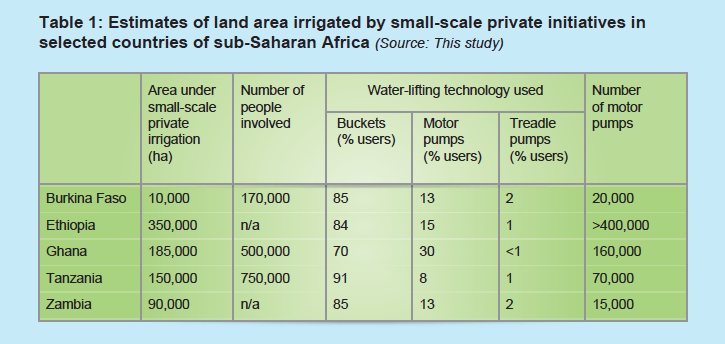
Field experiences
 Facilities Ibbagamuwa school Sri Lanka |
Pumps links
Smallholder irrigation could change the lives of millions of people
Smallholder farmers in sub-Saharan Africa and South Asia are increasingly using small-scale irrigation to cultivate their land. Individually owned and operated irrigation technologies improve yields, reduce risks associated with climate variability and increase incomes, allowing farmers to purchase food, health care and education. There is great potential for many more farmers to benefit from small-scale irrigation. This report presents governments, donors, lending institutions, the private sector and farmers with the opportunity to make well-informed decisions about investments in agricultural water management (AWM) that could change the lives of millions of rural people.
- Water for wealth and food security: Supporting farmer-driven investments in agricultural water management. 2012 study by AgWater Solutions.
